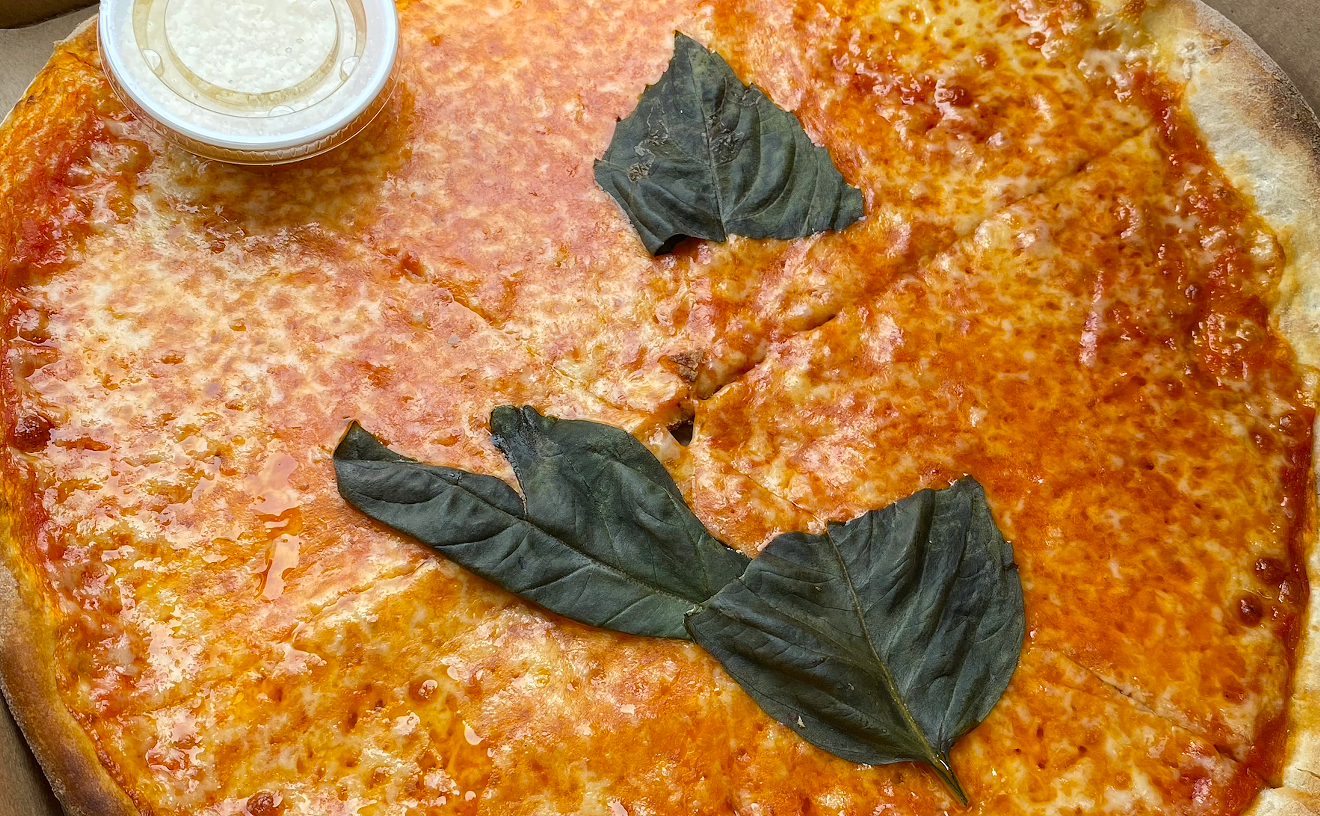Maybe, but you'd probably have to hop a plane to Jeddah to compete with the hospitality at this Saudi restaurant/grocery located on the northeast corner of University Drive and Sunrise Boulevard.
The hostess, who doubled as a waitress on a recent visit, saw us enter the front door rather timidly and almost ran across the room from the table she'd been bussing to welcome us -- even though we were obviously newcomers. Other diners, many of them Middle Easterners or American Muslims dressed in their finest, smiled and nodded their greetings. Even the young man hard at work playing Arabic dinner music on a keyboard/synthesizer gave us a wave.
This hospitality is undoubtedly tested repeatedly by first-timers who have struggled to find this thin slice of storefront. After wending through the crowded plaza, dodging cars and searching for some signal that you're getting warm, you'll finally come upon the restaurant's sign in the same spirit that the desert-weary Peter O'Toole caught sight of Omar Sharif in Lawrence of Arabia.
But in a much worse mood. Of course, culturally, you couldn't be in better hands for raising your spirits. "So Proud to Serve You" is al-Salam's motto and the core principle of Arabic hospitality. This attitude toward service is as intertwined with the culture's feeling about food as malapropisms seemed to be with the speeches of pre-Election Day Teresa Heinz Kerry.
For Arabs, mealtime courtesy is a direct measure of a person's worth. This kind of gentility spills over into the cooking and recipes. As exotic as it sounds, Saudi cuisine is a rather simple affair, reflecting three major influences: the nomadic culinary needs of the Bedouin (no refrigeration, for example), the ancient Arabian dominance of the spice routes, and the food restrictions stipulated in the Koran.
The historic Arabic acquaintance with spices brings an unexpected and aromatic character to the recipes. And the technology and Koran are important because they decree freshness and simplicity.
Al-Salam describes its food as "Mediterranean," but its recipes and inspiration are more diverse. In the U.S., "Mediterranean" food usually means Turkish or, more exactly, Lebanese cuisine. Here, you'll find a Greek salad and the falafels and baba ghannouj and taboulehs you already know. But you'll also discover much that is new and exciting. There's shakshoka, eggs cooked with tomato, onions, and spices such as cumin. And shawarma and kefta and kibi -- and many other outside-of-Damascus staples you'd find in Saudi or even Iraqi restaurants. You won't get a lot of ghee (clarified butter) or whole stuffed camel or goat, as you might at a Saudi wedding, but you probably aren't too disappointed about that, are you?
Indeed, the entire dining experience at al-Salam has a rare degree of authenticity. As you're seated and handed the menu, you'll see on your table the typical, free, premeal "starters" of dates, sliced pickled turnip, and green olives waiting for you in small dishes. Just sour enough for you to want more, the pickled turnips are a revelation.
As is the menu. I can't think of another restaurant in South Florida where you can find labaneh, a homestyle yogurt spread that is as popular and as widely used in Mideast culture as sour cream is in ours. Or a menu that has the same kallayeh (bits of meat with tomatoes, onions, and hot peppers) you might encounter on a dinner menu in Khamis Mushayt.
Among the 14 appetizers (up to $7.49 for four varieties of hummus), kibi ($3) makes a nice introduction to the virtues of this authentic Middle Eastern food. These particular kibi come as a pair of crispy shells of cracked wheat stuffed with pine nuts, beef, onions, and spices including cumin and then deep fried. Order a plate of the koddsieh ($4.49) to go with the kibi. Koddsieh is a rougher version of hummus, a blend of fava beans with tahini sauce, garlic, lemon juice, and olive oil. A basket of pita bread comes with this dish. The freshness of all the ingredients -- and the smart approach to healthful eating in the recipes -- made these dishes a satisfying way to begin a meal.
(Speaking of healthful eating, a side note: Keep track of the fat and carb calories and you'll see they're minimal. Watch more closely and you'll see that it's difficult to find a better balance among food groups, which is why you didn't see many fat Middle Easterners before the arrival of BK and Micky D's. After the arrival of the Americans in the '70s, however, fast food became popular. Overweight youth are now almost as common on the streets of Riyadh as here. Further note: I know this because I lived there for two years.)
Variety is not the spice of life in the entrées -- spices and herbs are. Thanks to a liberal and effective use of both, Middle Easterners can do more with a cucumber than most cuisines can with an entire salad. The same rule applies to all the basics of this kind of food. Coriander, cumin, dried mint, nutmeg, allspice, sesame and pomegranate seeds, cardamom -- a catch-all of exotic tastes embroider the basic bulgar wheat, vegetables, dried fruit, meat, and rice staples of this diet and can make such mild-mannered underachievers as chicken breast and lamb chops quiver with strange, exciting flavors.
Don't be timid. Try the evening buffet ($11.99), a cannonball into the classics: potatoes with tahini sauce, stuffed tomatoes, red peppers stuffed with kibi, cabbage stuffed with rice, chicken soup, rice, hummus. Or do a swan dive into the meal with an order of shawarma ($7.99). One layer of thin meat marinated with vinegar, cinnamon, garlic, and allspice is stacked patiently upon another layer of thin meat, then cooked on a rotisserie until all you have left is a pile of meltingly tender, well-done pieces of beef. Or chicken. Or lamb. Shawarma appears in many forms among the entrées, as does the faithful shish kabob (beef, lamb, and kefta), on platters and in combination plates.
It's easy to overeat (enormous entrée portions are served with salad rice or French fries), but save some room for the famous Middle Eastern pastries (85 cents). People in this part of the world love their sugar, and they like to eat it in little cakes and cookies that look like petits fours. Whether you've chosen a boughasha, a cigar-like pastry made of phyllo dough and shelled walnuts and more sugar than you'd like to know; ma'amul cookies starring cloves, nutmeg, and orange blossom flavoring; or just a plain old baklava with walnuts or pistachios, you'll find yourself going back to the display case in the rear of the room for just one more. Throw a few of them down with a pot of hot, mint-flavored tea served in tiny glass cups and you'll end your meal in authentic Mideast style -- slightly bloated and ready to burp with pleasure.
But at al-Salam, the meal isn't everything. There's a grocery store next door, replete with the wonders of the East. Hookahs, those elaborate pipes that these people once used for sitting around, cogitating, and smoking fruit-flavored tobacco (they're now prohibited in Saudi Arabia), come in all shapes and prices, as do the abayahs required to be worn by all women. Piles of fresh almonds, jars of bitter orange marmalade, bins of olives and spices, and paintings of Arabic women with outsized eyes looking over mountain ranges (much like T.J. Eckleberg surveying the Long Island ash heaps in The Great Gatsby) -- they're all here and provide fascinating glimpses into a culture that we rarely experience.
A last touch? Before you head home, don't miss the Magic Faucet bidet, for sale and for some reason parked immediately outside the front door of the store. It's an unforgettable sight right there on the walkway and a perfectly unpredictable way to end one of the more exciting eating adventures in South Florida.










